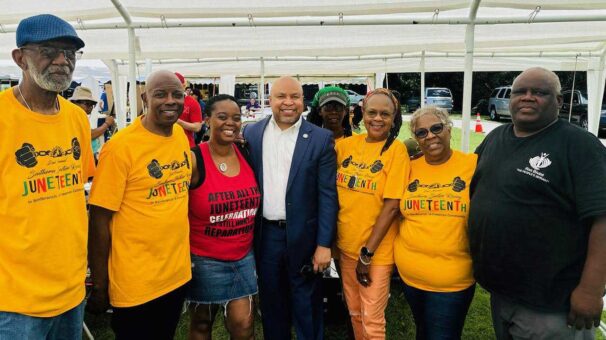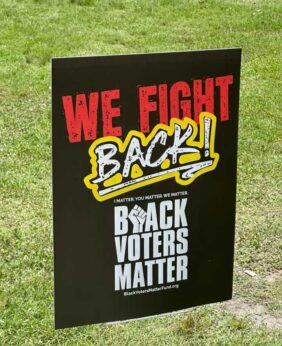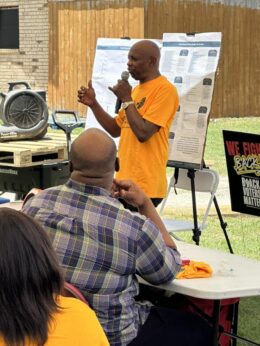
SANDBRANCH, Texas—The residents of the predominantly Black and low-income Texas community of Sandbranch can’t drink the water from their taps because it’s too polluted. Raising awareness and organizing a fightback against the situation was the focus of Southern Sector Rising’s second annual Juneteenth Celebration here on June 19.
For more than 150 years, the people who live here have never had potable water. Though located just minutes from Dallas, there is no centralized running water system – only wells, which are contaminated and unreliable.

Southern Sector Rising is determined to help do something. It is a community organization that brings attention to racial, economic, and social inequalities in the Dallas metro area. Much of its work centers on environmental racism, which is precisely what’s going on in Sandbranch, a “freedman’s town” where formerly enslaved African Americans sought refuge after the Civil War.
Environmental racism refers to the phenomenon whereby polluting industries are placed in predominantly African American and Latina/o communities. The air or water are often polluted, making the people who live in these communities more susceptible to a variety of respiratory and other illnesses. It’s a part of how white supremacist racial exploitation and oppression is built into the capitalist system.

The Juneteenth gathering took place at the Wayside Missionary Baptist Church in Sandbranch, which is a community within the town of Seagoville. The church is a hub for everyone in the community; it’s where they come together every Saturday morning to collect the bottled water that is an absolute necessity to survive here.
Southern Sector Rising was formed in 2019 to shine a spotlight on “Shingle Mountain,” a dumping ground holding 100,000 tons of discarded roofing shingles right next to the home of Marsha Jackson in Floral Farms, a community in southeastern Dallas. Jackson and her family became sick with asthma and other respiratory illnesses thanks to the chemicals and tar saturating the dumpsite.
Thanks to the efforts of Jackson, Southern Sector Rising, and other community activists, Shingle Mountain was removed in May 2021. Now, attention has turned to Sandbranch and the dangerous water flowing through its pipes.

Several speakers and supporters were present at Wayside Missionary to help sound the alarm on Juneteenth, including Texas State Rep. Carl Sherman and Dallas City Councilman Tennell Atkins. They both said the call must go out: Sandbranch doesn’t have any water, and the City of Dallas must provide them with clean running water.
Derek Avery, a community activist and affordable housing developer who ran for a Dallas County Commissioner’s seat in May, also spoke at the Juneteenth event about the injustice of what’s happened here for more than a century. He has been a consistent advocate for Sandbranch, helping to organize the Saturday bottled water deliveries.
Representatives from the Environmental Protection Agency spoke about the quality of the local water, emphasizing that it isn’t safe for anyone to drink.
Public utilities officials were not present, but they’ve argued Sandbranch is on a floodplain and therefore the estimated $6.5 million it would take to provide the remaining 88 residents with water and sewage service is a poor use of public money. The county has told those who live here to just move.
Local residents don’t buy the explanation, though, as several other areas – white-majority areas – are also in floodplains, but they have clean water piped to their neighborhoods. Decades ago, Sandbranch resident Sallie Mae Smith told the Dallas-based D Magazine, “We’re too weak, too poor, and too Black for folks to care.”
Other residents of Dallas also live with the hazards of environmental racism, such as another freedman’s town of about 2,000 called Joppa. It is in the southern area of Dallas near Floral Farms, the former site of Shingle Mountain. Joppa has several cement factories that pollute the air that the mostly Black residents are forced to breathe. The community’s air pollution is two to three times higher than the rest of Dallas County, according to Natalie Johnson, a Texas A&M toxicologist.










